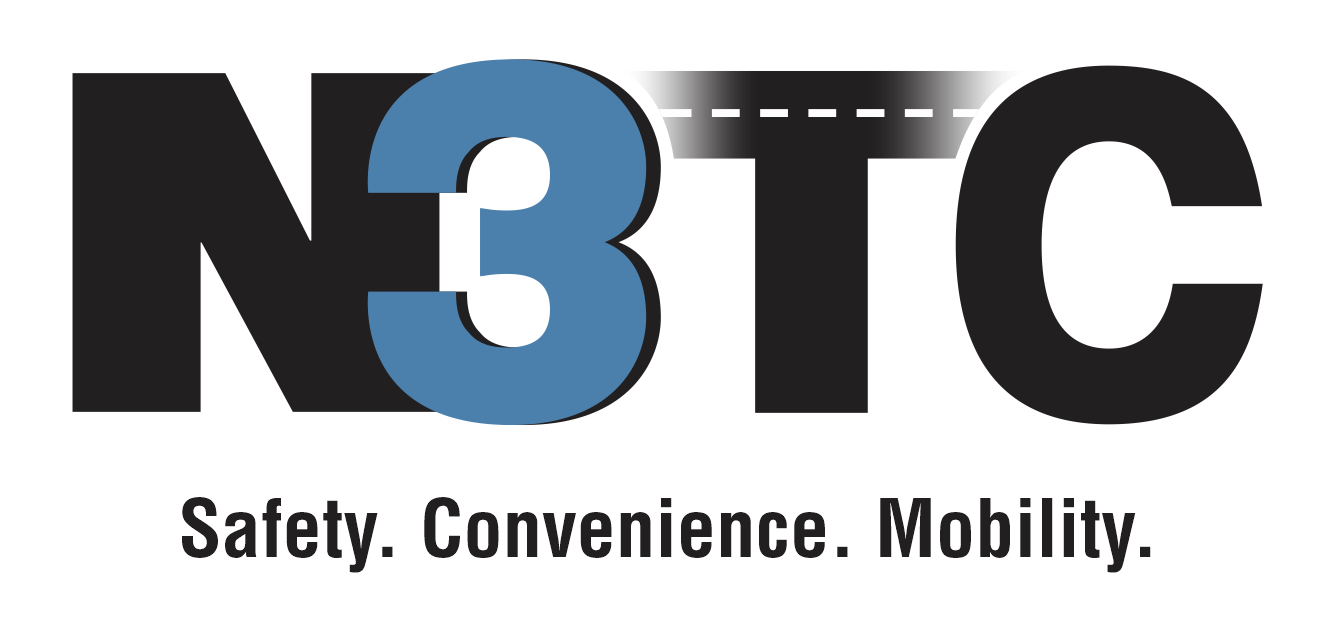N3 TOLL ROUTE – Amidst a global pandemic it’s incumbent on all travellers to carefully plan and prepare their summer holiday road trips
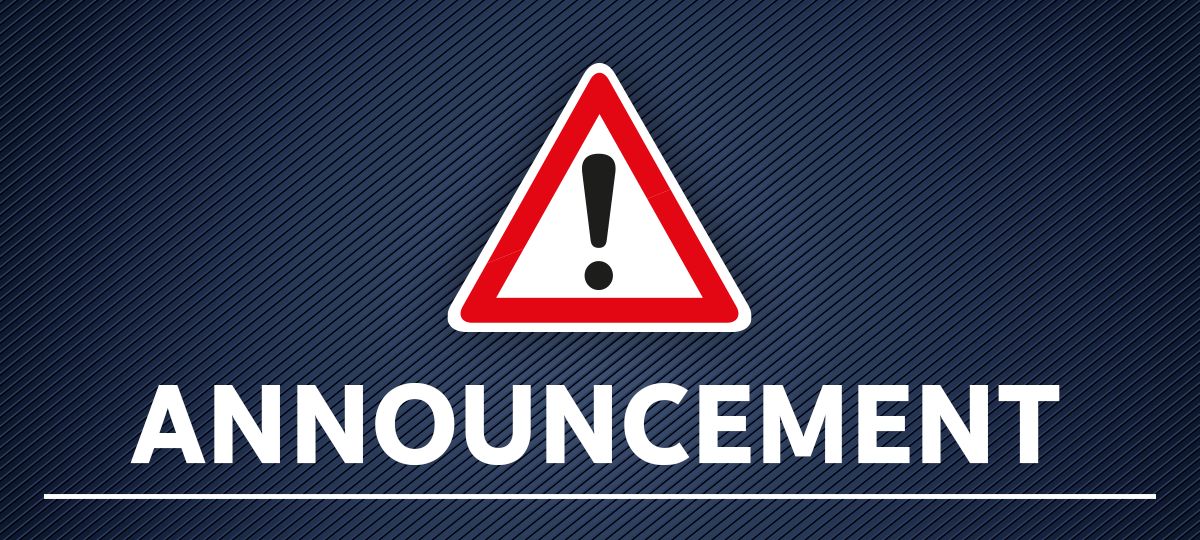
At the end of an unprecedented year, it is clear that the disruption of our daily lives due to the Covid-19 pandemic is set to continue for the foreseeable future.
N3 Toll Concession (N3TC) highly recommends all travellers carefully plan and prepare for their road trips on the N3 Toll Route this summer, and to stay informed of travel conditions at all times. N3TC manages 415 kilometres of N3 Toll Route between Heidelberg in Gauteng and Cedara in KwaZulu-Natal.
“Many South African businesses are operating later into December to recover lost time and revenue as a result of the earlier hard lockdown, and schools and universities are also closing and re-opening later. Therefore, the traditional summer holiday peak season is expected to be very different from previous years,” says Thania Dhoogra, N3TC’s operations manager.
“The current second wave of the coronavirus in our country, and the additional safety measures and revised restrictions being implemented to limit the spread of the disease, may further impact on the holiday season and expected peak traffic periods. Travellers are reminded to carefully follow the latest health and travel advisories at all times.”
N3TC is ready to welcome holidaymakers to one of SA’s busiest routes
“Whilst it remains unclear exactly how the upcoming holiday season will unfold, N3TC has, nonetheless, carefully prepared for every foreseen eventuality. No effort is being spared to ensure the safety, mobility and convenience of our road users. We are ready to welcome an influx of holidaymakers to the N3,” continues Ms Dhoogra.
No road works from 18 December, but restrictions may apply in construction zones
Earlier this year, the national Level 1 lockdown resulted in a break in the N3 Toll Route’s road maintenance and rehabilitation programme. N3TC’s contractors have pulled out all stops to make up for the lost time, and are ready to cease all road works, except essential maintenance work, on Friday, 18 December 2020.
Construction and rehabilitation work will recommence on Monday, 04 January 2021 in the following sections:
- Schaaprand to Warden
- Warden to Harrismith
- Van Reenen’s Pass
- Keeversfontein to Sand River
- Frere to Midway
- Nottingham Road to Cedara
“Some of the above sections will remain subject to temporary speed restrictions, and for safety reasons, may continue to be partially barricaded due to incomplete construction. The good news, however, is that at least two lanes will be open to traffic in each direction along the entire route during December,” confirms Ms Dhoogra.
Crash data continues to underline the importance of individual driver responsibility
Analysis of crash statistics and traffic data on the N3 Toll Route reveal that human error remains the top contributing factor to both light and heavy motor vehicle crashes (69% in case of light motor vehicle and 83% in heavy motor vehicle crashes).
Of the total number of crashes recorded during 2019, the main types of crashes were single vehicles leaving the road or single vehicles rolling; followed by head-tail collisions; side swipes and multiple pile-ups. These factors all point to negligent driving, including speeding, a general lack of concentration, distractedness, aggressive driving behaviour and ignoring road signs.
Mechanical vehicle failure, including brake failure and tyre bursts, contributed to an average of 11% of light motor vehicles crashes and 13% of heavy motor vehicle incidents. These incidents are avoidable by keeping vehicles roadworthy and in good mechanical order.
Litter is not only unsightly, but may pose serious safety threats
“Despite the daily efforts of our routine maintenance teams to keep the N3 roadside clean and free of litter, it remains an on-going battle, showing little sign of abating,” says Ms Dhoogra. “It is concerning to note that litter (or objects in the road) is the probable cause of as much as 10% of light vehicle crashes (for heavy vehicles it is 1%).”
Maintenance teams collect more than 6000 bags of rubbish along the N3 Toll Route each month. Besides the rubbish that can be bagged, debris such as metal, rubber, vehicle parts and dropped loads may pose serious road safety, health and environmental threats.
“In the interest of people’s health and safety, the well-being of the communities, as well as minimising the impact on the natural habitats and agricultural operations which form part of the N3 corridor, we appeal to all road users to help us fight this scourge. Please keep your rubbish in your vehicle, and only dispose thereof at designated disposal sites or bins, where it is safe to do so.”
N3TC’s route patrol teams sweep the entire route in both directions daily to remove dangerous objects. Additionally, they respond to reported scenes to remove possible dangerous objects from the road as quickly as possible. They will double their efforts during the upcoming peak traffic season, but road users can assist them even further by reporting potentially dangerous objects in the road to N3TC’s Route Control Centre on its 24-hour helpline: 0800 63 43 57.
Visible law enforcement and partnerships enhance road safety
In planning and preparing for the peak season, N3TC’s Route Service teams are continuing to work closely with law enforcement, emergency services and auxiliary service providers to enhance the overall safety of road users. There will be an increased presence of law enforcement and emergency service providers, including community medical services. They will be highly visible and stationed at various key points along the route to swiftly respond to emergency situations.
Travellers should prepare for multiple traffic checkpoints along the N3 corridor where random alcohol and drug screening tests as well as vehicle road worthiness checks will be performed. Speed timing enforcement is in place along the entire N3 Toll Route. Please pay attention to the sign posted speed limits as reduced limits are in place along certain sections of the route.
Take care at toll plazas
11,6% of the total number of crashes recorded on the N3 Toll Route during 2019, occurred in the vicinity of toll plazas.
These incidents can easily be avoided by adhering to the various warning signs and slowing down early enough on approach to a toll plaza,” says Ms Dhoogra.
“Reduce your speed and remain alert around toll plazas, especially when congestion is experienced during peak traffic conditions. To further assist road users choosing the correct plaza lane, we have upgraded overhead signage at all toll plazas.”
Payment methods accepted by the national tolling system in SA
For increased mobility and safety, electronic tags are highly recommended and accepted in all lanes at N3TC toll plazas.
Alternative accepted payment methods include credit cards, cash or petrol/garage cards. No payments with debit cards can be processed at any of the toll plazas in South Africa.
Traffic forecasts
The traffic forecasts below provide an indication of the expected traffic volumes and peak conditions on the N3 Toll Route in a southbound direction (towards KwaZulu-Natal) and a northbound direction (towards Gauteng) this holiday season.
Slow moving conditions are expected when traffic volumes are high. High (heavy) volumes constitute more than 1500 vehicles per hour in a particular direction. On the N3 Toll Route volumes can increase to between 2000 and 3500 vehicles per hour on peak days.
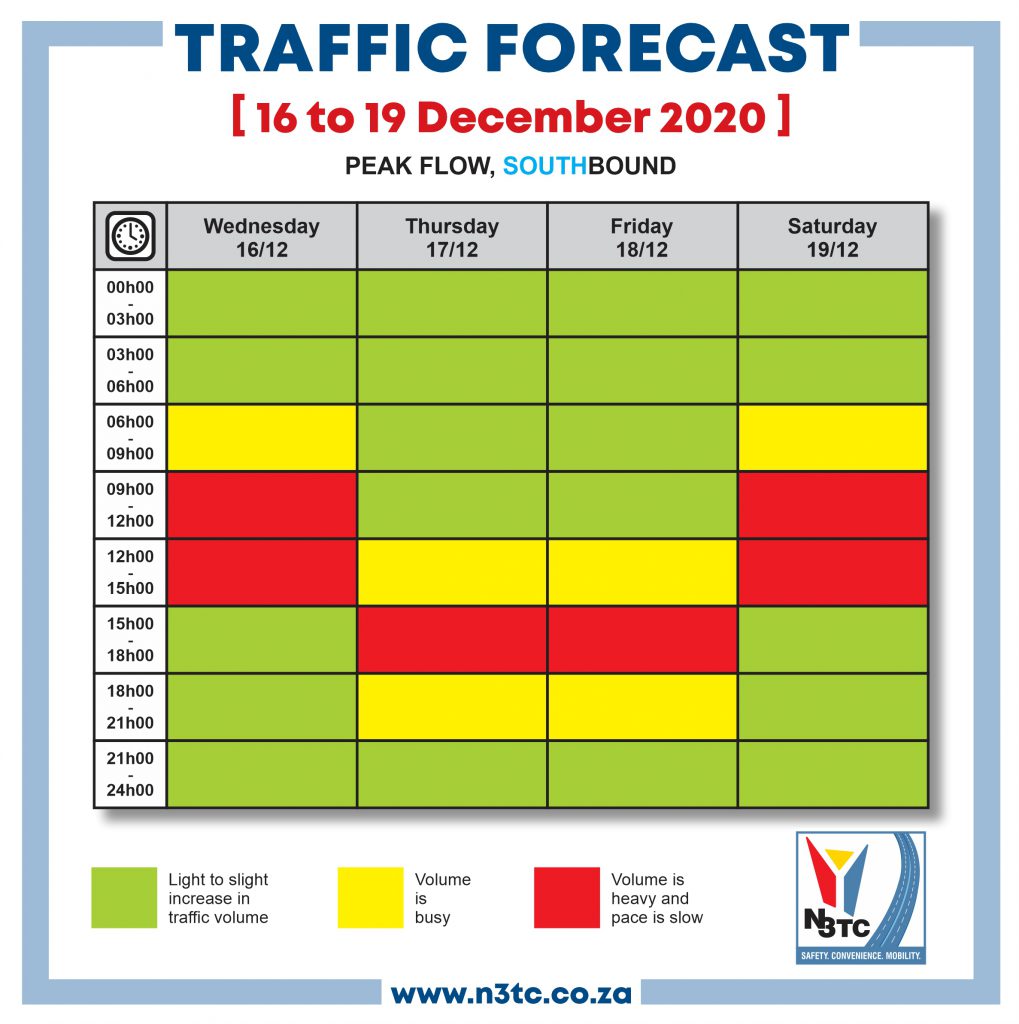
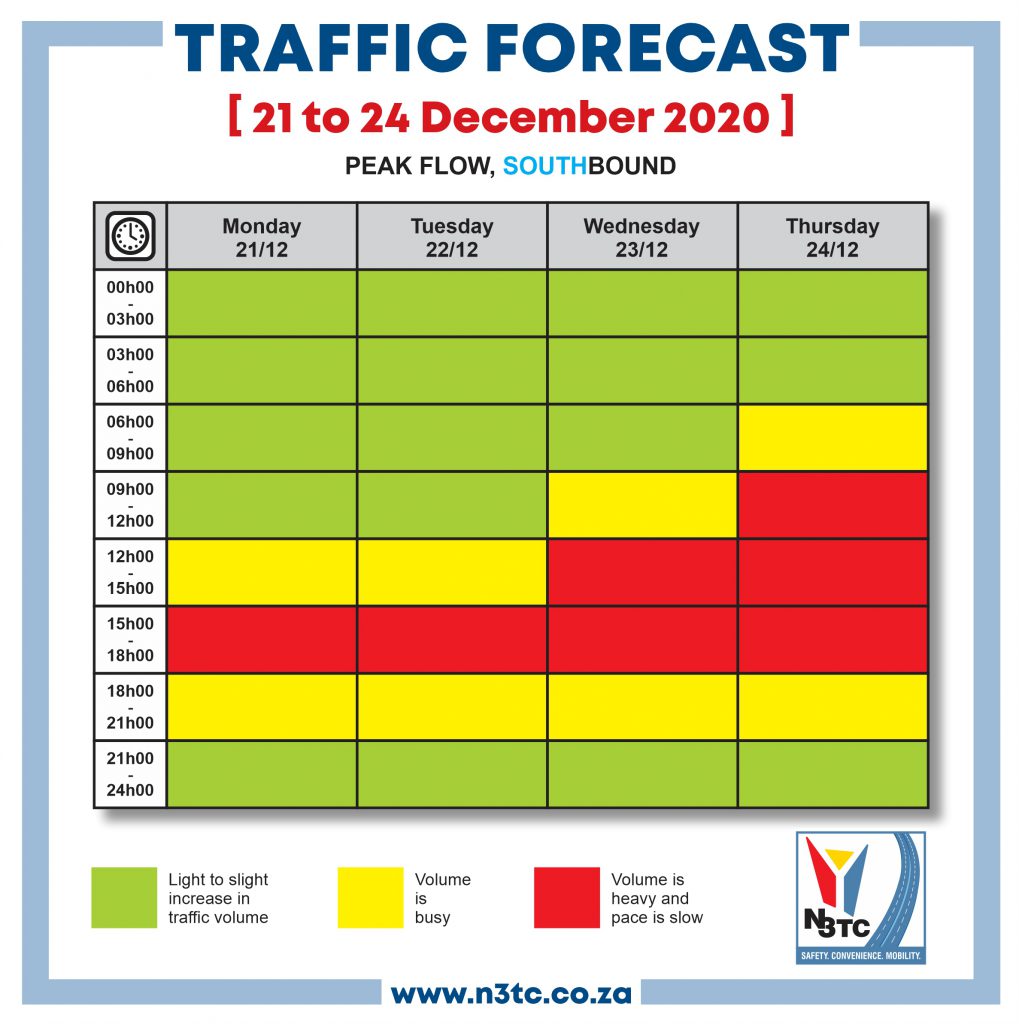
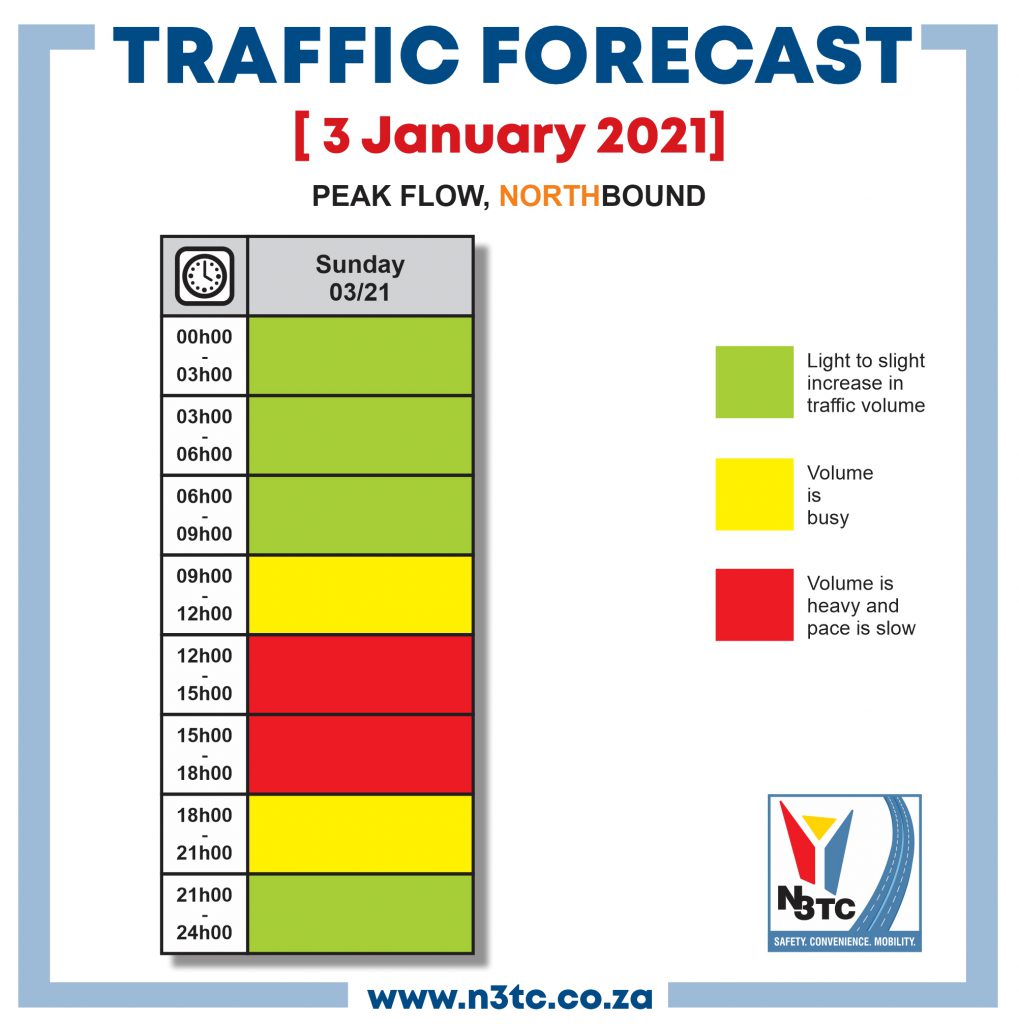
Stay informed to keep safe on the N3 Toll Route
N3TC advises all road users to follow reputable information sources to keep abreast of all current conditions, traffic updates and alerts on the N3 Toll Route.
“Real-time traffic information greatly assists road users to be better-prepared and safer drivers. We, therefore, encourage you to heed all the warning signs on the road, and also to involve your passengers in talking to us on Facebook or Twitter: @N3Route or to obtain current and verified traffic information from N3TC’s 24-hour helpline: 0800 63 43 57. This number can also be called should you need help during emergencies or to report any problems whilst travelling on the N3 between Heidelberg and Cedara,” ends Thania Dhoogra.
…/ends
